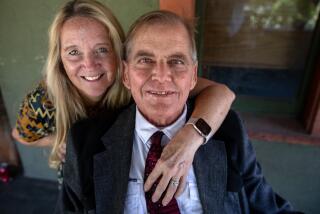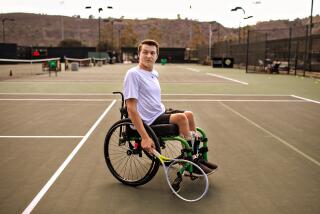Workers Build an $80,000 Gift to Paralyzed Teen-Ager : Present: For his birthday, a former swimmer gets an addition to his home to accommodate his wheelchair.
- Share via
WESTMINSTER — People do amazing things for 15-year-old David Lupash. It has been that way since he dived into a Long Beach sandbar almost three years ago, nearly severed his spine and bobbed to the ocean surface paralyzed.
While he was still in the hospital, 100 Seal Beach swim team pals canvassed neighborhoods collecting contributions for his medical bills. Sunday school classmates held prayer vigils. Community swim-a-thons netted more donations. And the Seal Beach Junior Women’s Club still holds fund-raising events, such as an annual lasagna dinner.
Now a team of guardian construction workers is giving him an $80,000 birthday present. Free of charge, they have built a two-story, 1,080-square-feet wing to the Lupash family home in Westminster that will accommodate David’s wheelchair.
David, a functional quadriplegic, will move in today, the day he turns 16.
“I’ve just fallen in love with the kid,” said Ron Sehnert, a Long Beach contractor and driving force behind the construction. “You just don’t meet people with his incredible attitude.”
“He’s quite a young man,” added Bob Oppermann, owner of a Whittier elevator company whose employees worked on their own time to recondition a teak wheelchair lift for David’s new digs. “I don’t mind giving my time.”
At 13, the teen-age charmer was a promising swimmer and junior lifeguard, a budding violinist fluent in Romanian who was earning straight A’s at McAuliffe Middle School in Los Alamitos.
His family lives at the edge of Westminster but closer to the heart of Seal Beach, a town still small enough that news of the accident would galvanize the community within a week.
On that bright July afternoon in 1988, David and his identical twin, Daniel, 60 seconds his junior, performed in a junior lifeguard competition at the Long Beach shore. During his turn in a relay, David ran into the surf but plunged into a wave without first placing his hands together over his head in a diving position.
His forehead slammed into a sandbar, snapping his fourth cervical. He has been paralyzed ever since. A veteran of numerous hospitalizations and a daily rigor of physical therapy and tutoring, the brown-haired teen-ager is what is called an incomplete quadriplegic, meaning he has patchy sensation all over his body and limited movement, but not enough for any practical use.
A switch-operated, motorized wheelchair ferries him around the kitchen-family room, which has become his bedroom. There are no downstairs bedrooms and, until now, it was the only room in the two-story tract house off Bolsa Chica Avenue with enough space for his special bed, therapy equipment and computer.
Every morning, David works with a therapist stretching his arms and legs. He is fed and groomed and lifted into his wheelchair so he can do his schoolwork. With a home teacher, he studies such subjects as honors English and geometry, and remains at the same sophomore level as his brother, a Los Alamitos High School student. David hopes to enroll there next year.
And he may end up at USC, where he is a candidate for the Swim With Mike scholarship for injured athletes. Established after All-America USC swimmer Mike Nyeholt was paralyzed in a 1981 motorcycle accident, the scholarship would provide David with full tuition, housing and a monthly stipend for expenses. If David earns admission to the university, he will receive the scholarship, which is bankrolled with donations that largely come from an annual swim-a-thon that has been attended by U.S. presidents.
Even the best insurance won’t cover the exorbitant costs of caring for someone wheelchair-bound, which is an around-the-clock effort. Family friends and members of the community formed the David and Goliath Project, which has raised thousands of dollars to pay for his wheelchair, a van equipped with a wheelchair lift and other rehabilitation expenses.
His doctor, Mark Wheaton, has called him “the best patient I ever had.”
His relationship with Sehnert is also one of mutual devotion.
“Ron is here every day, making sure things get done,” David says with a touch of amazement. “I asked him one day, ‘How did you convince all these people to do this? It’s a recession now.’ A lot of them come in on Saturday and some of them are contractors who maybe Ron helped at some time. It shows you there really are people who want to help” but need a leader.
“You don’t need to have a master’s degree or be an intellectual to be a contractor,” David added. “You just have to know how to communicate to get things done. It’s just the kind of person Ron is.”
Such unfailing love and support of friends and his devoted close-knit family--the twins have an adoring older sister, Ruth, 18, a Wheaton College computer science major--have helped him maintain an attitude Mother Teresa would admire.
“I’ve matured; I have a lot more character. Patience. Going through what I’ve been through . . . with my close-knit family. . . . God gives me just enough help to get by that day,” David said, watching all the work on his behalf from the patio. “In a second, life changes, and you have to change yourself, and it’s all a matter of adapting.”
That ability to accept the hand dealt him so impressed Sehnert at their first meeting near the end of 1990 that he decided to oversee the home expansion himself, single-handedly rallying a team of subcontractors to contribute weeks of their own time.
Attached to the kitchen downstairs and his parents’ bedroom upstairs, the two-story addition offers enough space for David to have a real bedroom plus his special computer, which he operates by blowing Morse code signals into an air tube.
The upstairs room will be used for his hours of daily physical therapy and, possibly one day, an attendant. A bathroom on each floor is roomy enough for either a wheelchair or gurney to be rolled in. The rooms are equipped with push-on light and power switches and lots of windows to deliver the daily 30 minutes of sunshine that Sehnert says David needs. Other extra touches: the letters DL in rose-colored linoleum at the front-yard entrance to the wing, mirrors to bring the outdoors inside and bougainvillea “to cheer the place up,” Sehnert said.
One day last week, 15 volunteers bustled about the home, racing to get the project completed by Saturday. Long Beach tile setter Ron Olson and apprentice Wes Weeks spent the last of five days’ work finishing two new showers roomy enough for a wheelchair. Evan Harbottle’s crew prepared to pour donated concrete for a sidewalk that will carry David’s wheelchair around the perimeter of the home. Two more workers finished kitchen cabinets.
“It’s unbelievable,” murmured Cornelia Lupash as she arrived home from her job as a Long Beach City College chemistry professor. Along with her husband, Tiberius, a supervisor in the public works engineering division of the Seal Beach Naval Weapons Station, the couple take shifts working and caring round-the-clock for David.
Harbottle, owner of AEH Corp., has for weeks driven the 80 miles from Temecula each day to work on the volunteer effort, identified by a front lawn sign that reads: “This project funded by love.” He estimates that he and his employees have spent about 80 hours on the project, and he said they were happy to do it. He hasn’t even figured what that costs him.
“I really don’t consider it that way,” Harbottle said. “He’s a very nice boy, intelligent, considerate.”
Daniel Montoya stood in a baseball cap on the dirt front lawn, supervising a crew that would install sprinklers, plants and otherwise restore the yard after the new sidewalk was installed. The Huntington Beach landscaper recalled how he and six employees became involved in the effort, donating a week and a half’s time.
“Ron called me and told me he was doing something important, and he asked me, ‘How big is your heart?’ I says pretty big. And I figure Ron has a pretty big heart too. I said yes. Anything like this, (having) to do with a kid, you’ve gotta help.”
As “one of the concrete people,” Tony Lopez has been involved literally from the ground up. The Lakewood father of a 22-year-old son in college, Lopez said the weeks he has spent working and talking to David Lupash have given him new perspective and appreciation for things often taken for granted.
“He came out and he thanked me. I’m so glad I could help,” Lopez, 52, said thoughtfully during a break from shoveling dirt for David’s wheelchair ramp. “. . . You learn a lesson from him. A lot of people could get depressed, but you talk to him and it’s a real morale booster.”
More to Read
Sign up for Essential California
The most important California stories and recommendations in your inbox every morning.
You may occasionally receive promotional content from the Los Angeles Times.













